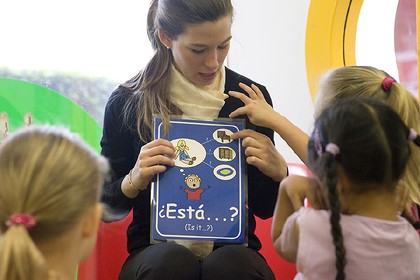
Teaching your baby a foreign language

Teaching your baby a foreign language
Teaching children a foreign language helps with brain development and lays the foundation for lifelong academic achievement, with the impact greatest the earlier the language is learnt.
It doesn’t really matter what language a child learns or even if they don’t become fluent; what’s important is the different way of looking at the world, openness to diverse concepts and critical thinking that learning a foreign language provides.
But you don’t need to be fluent in a foreign language to teach it effectively. All you need is a little preparation and lots of creativity. If the option is available to you the easiest way to introduce a foreign language in the home is to have a native speaking grandparent, family friend or nanny speak only one language to the child.
If not, enrol your child in a foreign language school, a childcare centre that offers a foreign language program or join a foreign language playgroup where you can mix with bilingual parents and children. You don’t need to worry if you are not a native speaker, rather concentrate on what you learn with your child and incorporate the new words into everyday language.
This can be as simple as replacing one word of an English sentence with the same word in the foreign language, such as a colour, a number or an animal. Replace English words with these words as often as possible.This will help build your child’s memory and skill.
Cue cards attached to doors, furniture, food, appliances, clothing and other items around the home are also an effective tool to help your child learn the words even quicker. Check out videos and movies with a bilingual approach or try watching your child’s favourite DVD with a foreign language soundtrack substituted for English (most DVDs have Select A Language option).
After a few months you will start to see progress, with your child naturally substituting foreign words for English equivalents in sentences, counting or identifying objects in the foreign language.
This approach is already starting to pay off for two-year-old Oliver Chaffey, who amazed his mother Cath Chaffey when he switched from English to French when counting. Oliver attends a childcare centre that offers the AlphaTykes French language immersion program with his sister Lucy, 16 months, who is starting to repeat words spoken to her in French.
"Lucy’s learning curve has skyrocketed since starting French, and I think it has also helped develop her English vocabulary as she knows a lot of words for a baby, as much as a two year old," Cath said.
I think learning a foreign language early helps stimulate their minds and will give them a positive attitude about learning languages and other cultures, even if they don’t continue French. For multilingual Helena Angove, who speaks Serbo-Croatian and German in addition to English, the language immersion program was the clincher to enrol her sons Latham, three years, and Marshall, two years.
“I want my boys
to have a multilingual upbringing so I speak with them in Serbo-Croatian at home
as well as help them practice what they’ve learned that day in French,”
“It instils confidence and helps them to develop better communication skills in general. I’ve noticed the change in both boys but particularly Marshal who was shyer in the beginning, but now he’s started talking we can’t keep him quiet.”
Remember that young children will stay engaged and respond to language instruction if you make it fun. Provide your child with a fun environment in which to practice the words and phrases that they have learned, incorporating these words into games and songs, you’ll be building a great base in the new language. And your child will be learning and not even realise it!
But for the ultimate language boost visit the country where the language is spoken.
Total immersion for a couple of weeks, particularly if your child is interacting with native speaking relatives and friends, will have an amazing effect and give them a lifelong love of language.
About AlphaTykes http://www.alphatykes.com.au/
AlphaTykes is a foreign language program introducing children 18 months to 12 years of age to Spanish, French and Italian.
It is the first
concept of its kind in
In